3114IBA: Volkswagen CSR Management Problem and Emission Scandal
VerifiedAdded on 2023/03/23
|13
|3031
|76
Report
AI Summary
This report provides a comprehensive analysis of the management problems within Volkswagen's Corporate Social Responsibility (CSR) strategy, particularly in the context of the emission scandal, often referred to as 'Dieselgate'. The study delves into the causes and consequences of Volkswagen's actions, including the deliberate programming of engines to cheat emission tests. It examines the impact of the scandal on Volkswagen's reputation, its financial performance, and its relationships with stakeholders. The report identifies key management failures, such as a lack of transparency, ethical lapses, and inadequate oversight of CSR initiatives. Furthermore, it offers recommendations for Volkswagen to rebuild its reputation, improve its CSR practices, and regain the trust of its customers, investors, and the public. These recommendations include adopting a more transparent and accountable approach to environmental protection, investing in sustainable mobility, and fostering a culture of ethical conduct within the company. The conclusion emphasizes the need for Volkswagen to demonstrate a genuine commitment to CSR to avoid future scandals and ensure long-term success.
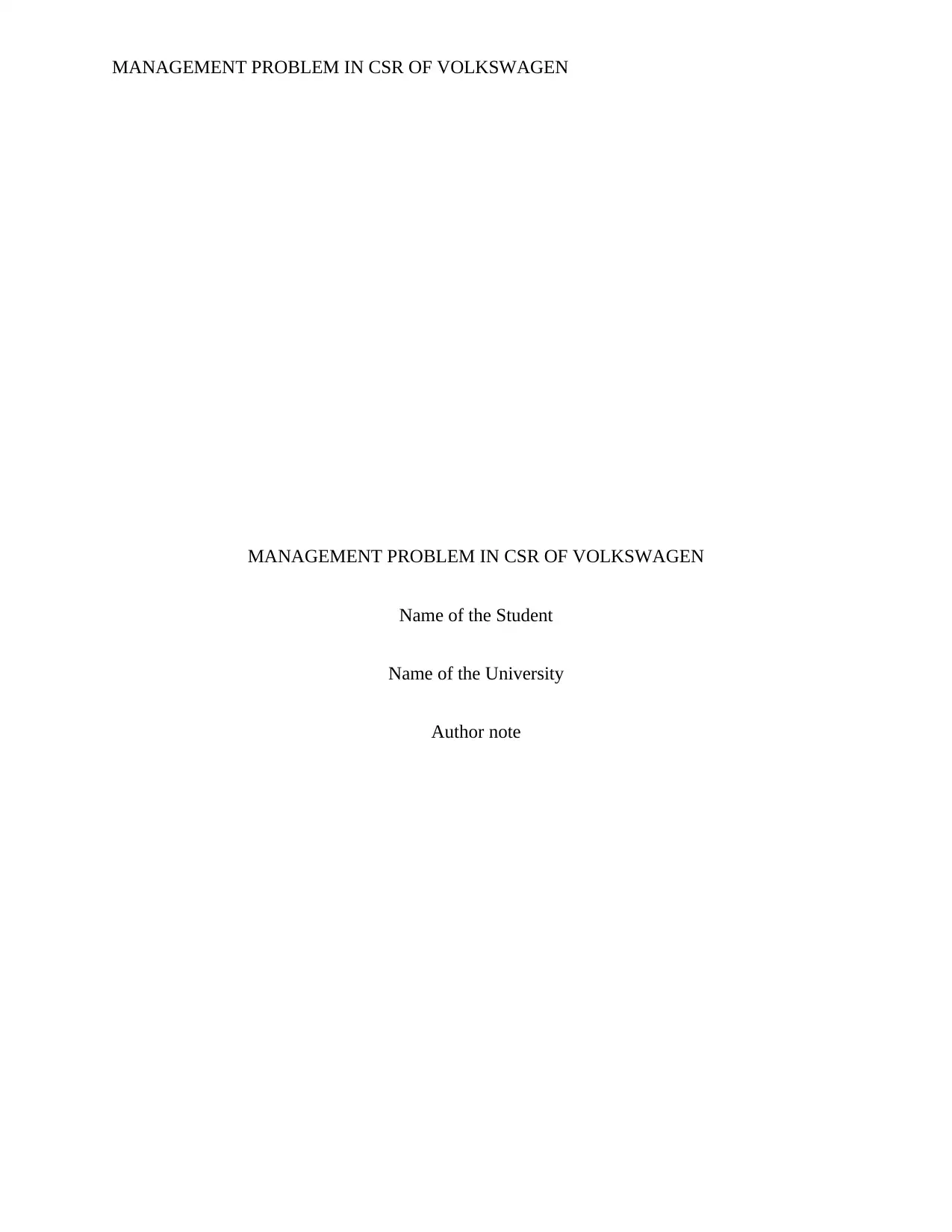
MANAGEMENT PROBLEM IN CSR OF VOLKSWAGEN
MANAGEMENT PROBLEM IN CSR OF VOLKSWAGEN
Name of the Student
Name of the University
Author note
MANAGEMENT PROBLEM IN CSR OF VOLKSWAGEN
Name of the Student
Name of the University
Author note
Paraphrase This Document
Need a fresh take? Get an instant paraphrase of this document with our AI Paraphraser
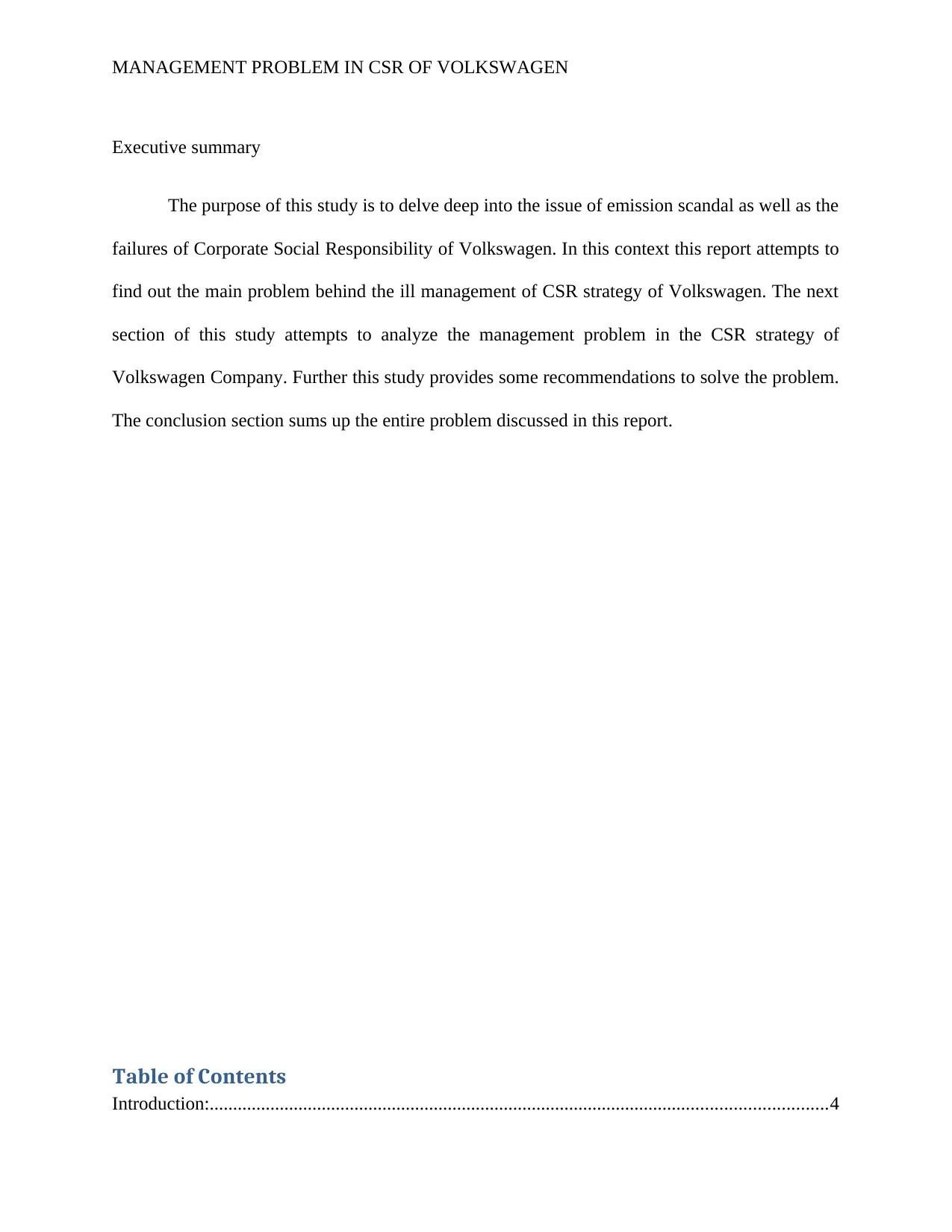
MANAGEMENT PROBLEM IN CSR OF VOLKSWAGEN
Executive summary
The purpose of this study is to delve deep into the issue of emission scandal as well as the
failures of Corporate Social Responsibility of Volkswagen. In this context this report attempts to
find out the main problem behind the ill management of CSR strategy of Volkswagen. The next
section of this study attempts to analyze the management problem in the CSR strategy of
Volkswagen Company. Further this study provides some recommendations to solve the problem.
The conclusion section sums up the entire problem discussed in this report.
Table of Contents
Introduction:....................................................................................................................................4
Executive summary
The purpose of this study is to delve deep into the issue of emission scandal as well as the
failures of Corporate Social Responsibility of Volkswagen. In this context this report attempts to
find out the main problem behind the ill management of CSR strategy of Volkswagen. The next
section of this study attempts to analyze the management problem in the CSR strategy of
Volkswagen Company. Further this study provides some recommendations to solve the problem.
The conclusion section sums up the entire problem discussed in this report.
Table of Contents
Introduction:....................................................................................................................................4
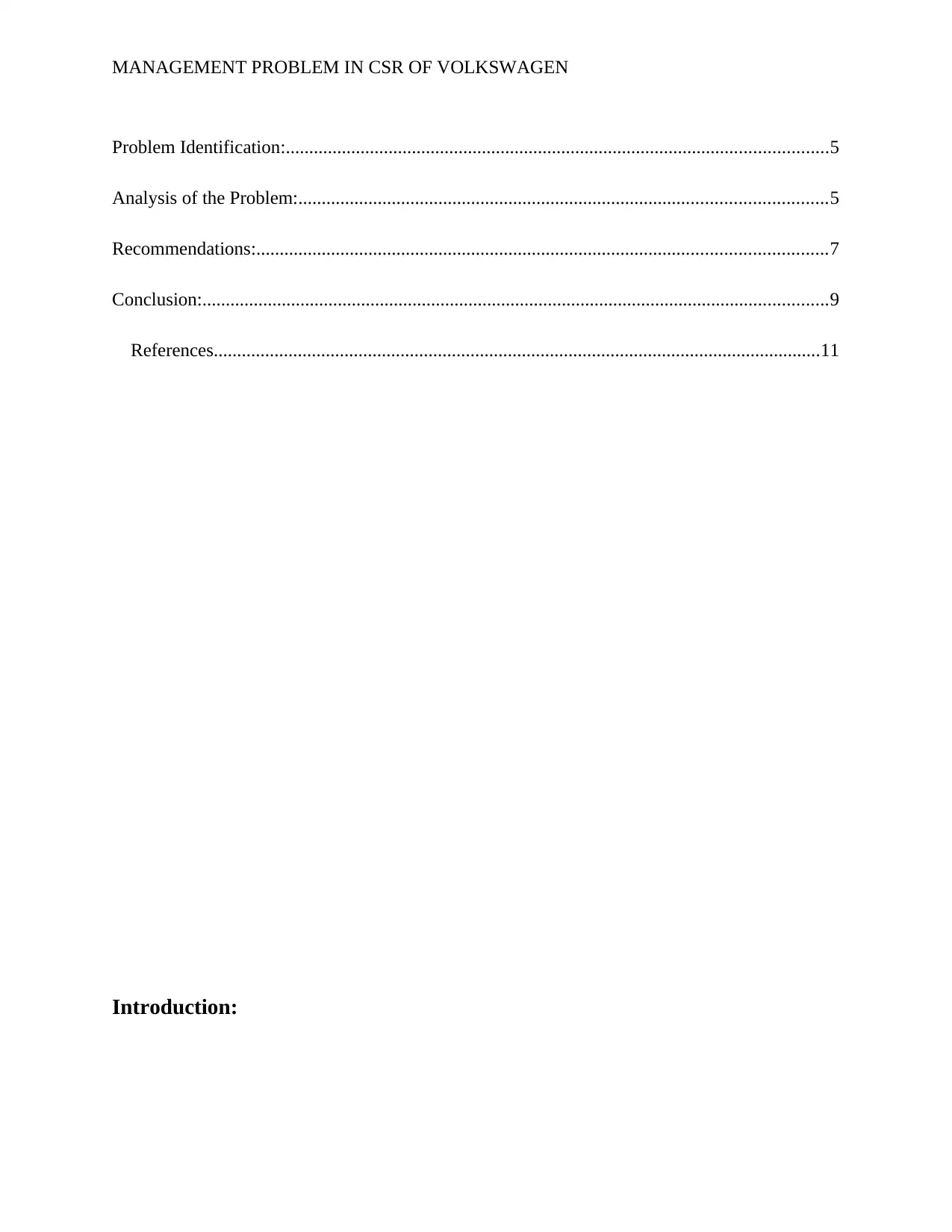
MANAGEMENT PROBLEM IN CSR OF VOLKSWAGEN
Problem Identification:....................................................................................................................5
Analysis of the Problem:.................................................................................................................5
Recommendations:..........................................................................................................................7
Conclusion:......................................................................................................................................9
References..................................................................................................................................11
Introduction:
Problem Identification:....................................................................................................................5
Analysis of the Problem:.................................................................................................................5
Recommendations:..........................................................................................................................7
Conclusion:......................................................................................................................................9
References..................................................................................................................................11
Introduction:
⊘ This is a preview!⊘
Do you want full access?
Subscribe today to unlock all pages.

Trusted by 1+ million students worldwide
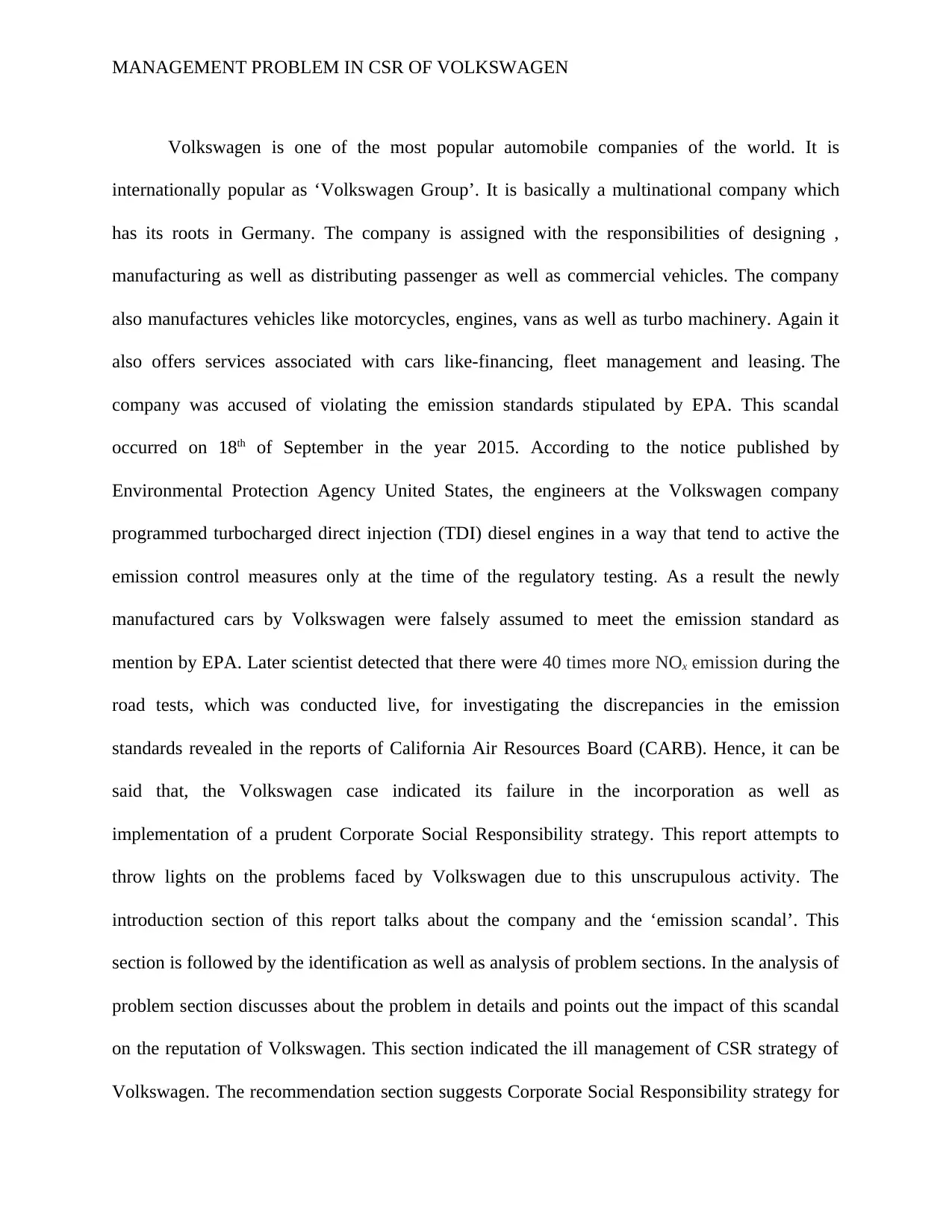
MANAGEMENT PROBLEM IN CSR OF VOLKSWAGEN
Volkswagen is one of the most popular automobile companies of the world. It is
internationally popular as ‘Volkswagen Group’. It is basically a multinational company which
has its roots in Germany. The company is assigned with the responsibilities of designing ,
manufacturing as well as distributing passenger as well as commercial vehicles. The company
also manufactures vehicles like motorcycles, engines, vans as well as turbo machinery. Again it
also offers services associated with cars like-financing, fleet management and leasing. The
company was accused of violating the emission standards stipulated by EPA. This scandal
occurred on 18th of September in the year 2015. According to the notice published by
Environmental Protection Agency United States, the engineers at the Volkswagen company
programmed turbocharged direct injection (TDI) diesel engines in a way that tend to active the
emission control measures only at the time of the regulatory testing. As a result the newly
manufactured cars by Volkswagen were falsely assumed to meet the emission standard as
mention by EPA. Later scientist detected that there were 40 times more NOx emission during the
road tests, which was conducted live, for investigating the discrepancies in the emission
standards revealed in the reports of California Air Resources Board (CARB). Hence, it can be
said that, the Volkswagen case indicated its failure in the incorporation as well as
implementation of a prudent Corporate Social Responsibility strategy. This report attempts to
throw lights on the problems faced by Volkswagen due to this unscrupulous activity. The
introduction section of this report talks about the company and the ‘emission scandal’. This
section is followed by the identification as well as analysis of problem sections. In the analysis of
problem section discusses about the problem in details and points out the impact of this scandal
on the reputation of Volkswagen. This section indicated the ill management of CSR strategy of
Volkswagen. The recommendation section suggests Corporate Social Responsibility strategy for
Volkswagen is one of the most popular automobile companies of the world. It is
internationally popular as ‘Volkswagen Group’. It is basically a multinational company which
has its roots in Germany. The company is assigned with the responsibilities of designing ,
manufacturing as well as distributing passenger as well as commercial vehicles. The company
also manufactures vehicles like motorcycles, engines, vans as well as turbo machinery. Again it
also offers services associated with cars like-financing, fleet management and leasing. The
company was accused of violating the emission standards stipulated by EPA. This scandal
occurred on 18th of September in the year 2015. According to the notice published by
Environmental Protection Agency United States, the engineers at the Volkswagen company
programmed turbocharged direct injection (TDI) diesel engines in a way that tend to active the
emission control measures only at the time of the regulatory testing. As a result the newly
manufactured cars by Volkswagen were falsely assumed to meet the emission standard as
mention by EPA. Later scientist detected that there were 40 times more NOx emission during the
road tests, which was conducted live, for investigating the discrepancies in the emission
standards revealed in the reports of California Air Resources Board (CARB). Hence, it can be
said that, the Volkswagen case indicated its failure in the incorporation as well as
implementation of a prudent Corporate Social Responsibility strategy. This report attempts to
throw lights on the problems faced by Volkswagen due to this unscrupulous activity. The
introduction section of this report talks about the company and the ‘emission scandal’. This
section is followed by the identification as well as analysis of problem sections. In the analysis of
problem section discusses about the problem in details and points out the impact of this scandal
on the reputation of Volkswagen. This section indicated the ill management of CSR strategy of
Volkswagen. The recommendation section suggests Corporate Social Responsibility strategy for
Paraphrase This Document
Need a fresh take? Get an instant paraphrase of this document with our AI Paraphraser
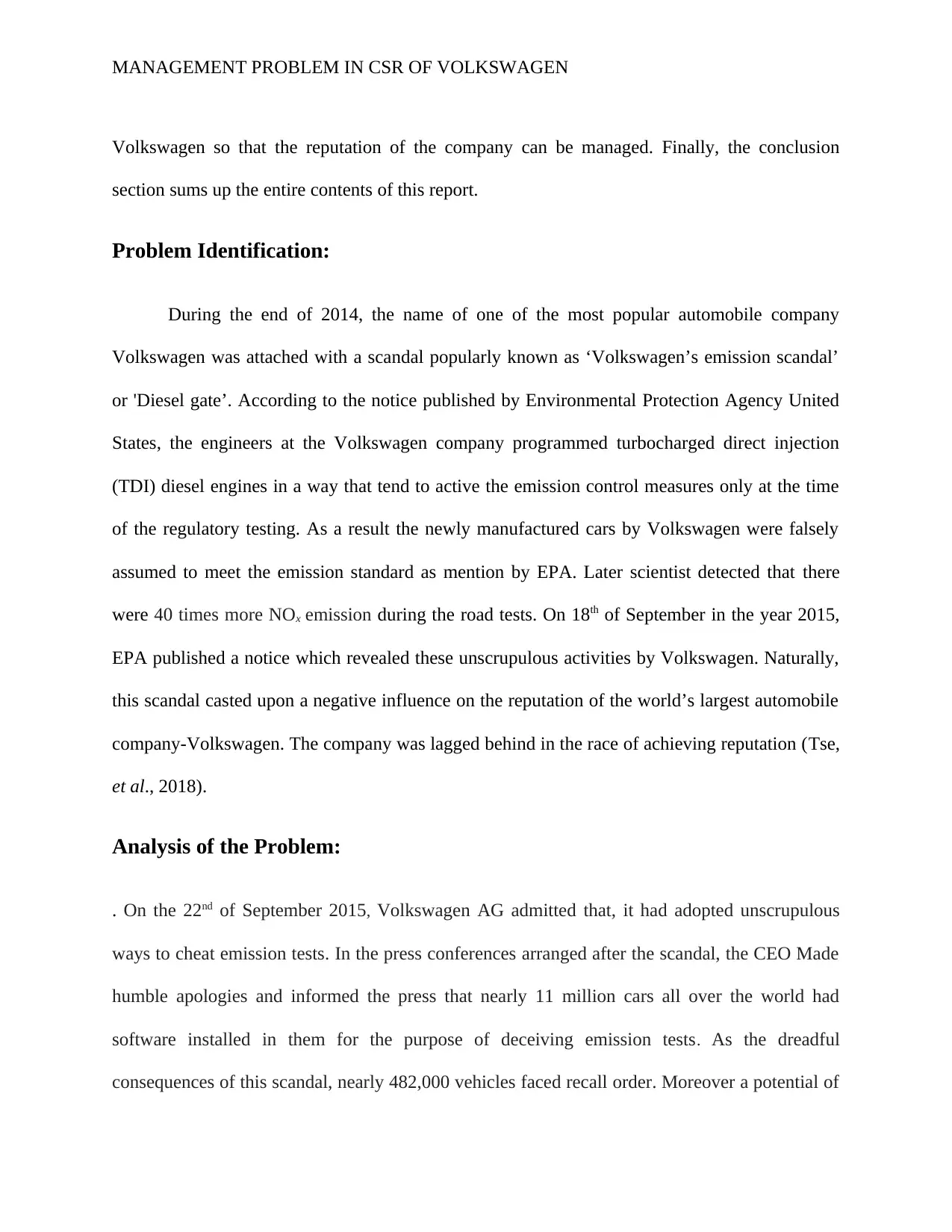
MANAGEMENT PROBLEM IN CSR OF VOLKSWAGEN
Volkswagen so that the reputation of the company can be managed. Finally, the conclusion
section sums up the entire contents of this report.
Problem Identification:
During the end of 2014, the name of one of the most popular automobile company
Volkswagen was attached with a scandal popularly known as ‘Volkswagen’s emission scandal’
or 'Diesel gate’. According to the notice published by Environmental Protection Agency United
States, the engineers at the Volkswagen company programmed turbocharged direct injection
(TDI) diesel engines in a way that tend to active the emission control measures only at the time
of the regulatory testing. As a result the newly manufactured cars by Volkswagen were falsely
assumed to meet the emission standard as mention by EPA. Later scientist detected that there
were 40 times more NOx emission during the road tests. On 18th of September in the year 2015,
EPA published a notice which revealed these unscrupulous activities by Volkswagen. Naturally,
this scandal casted upon a negative influence on the reputation of the world’s largest automobile
company-Volkswagen. The company was lagged behind in the race of achieving reputation (Tse,
et al., 2018).
Analysis of the Problem:
. On the 22nd of September 2015, Volkswagen AG admitted that, it had adopted unscrupulous
ways to cheat emission tests. In the press conferences arranged after the scandal, the CEO Made
humble apologies and informed the press that nearly 11 million cars all over the world had
software installed in them for the purpose of deceiving emission tests. As the dreadful
consequences of this scandal, nearly 482,000 vehicles faced recall order. Moreover a potential of
Volkswagen so that the reputation of the company can be managed. Finally, the conclusion
section sums up the entire contents of this report.
Problem Identification:
During the end of 2014, the name of one of the most popular automobile company
Volkswagen was attached with a scandal popularly known as ‘Volkswagen’s emission scandal’
or 'Diesel gate’. According to the notice published by Environmental Protection Agency United
States, the engineers at the Volkswagen company programmed turbocharged direct injection
(TDI) diesel engines in a way that tend to active the emission control measures only at the time
of the regulatory testing. As a result the newly manufactured cars by Volkswagen were falsely
assumed to meet the emission standard as mention by EPA. Later scientist detected that there
were 40 times more NOx emission during the road tests. On 18th of September in the year 2015,
EPA published a notice which revealed these unscrupulous activities by Volkswagen. Naturally,
this scandal casted upon a negative influence on the reputation of the world’s largest automobile
company-Volkswagen. The company was lagged behind in the race of achieving reputation (Tse,
et al., 2018).
Analysis of the Problem:
. On the 22nd of September 2015, Volkswagen AG admitted that, it had adopted unscrupulous
ways to cheat emission tests. In the press conferences arranged after the scandal, the CEO Made
humble apologies and informed the press that nearly 11 million cars all over the world had
software installed in them for the purpose of deceiving emission tests. As the dreadful
consequences of this scandal, nearly 482,000 vehicles faced recall order. Moreover a potential of
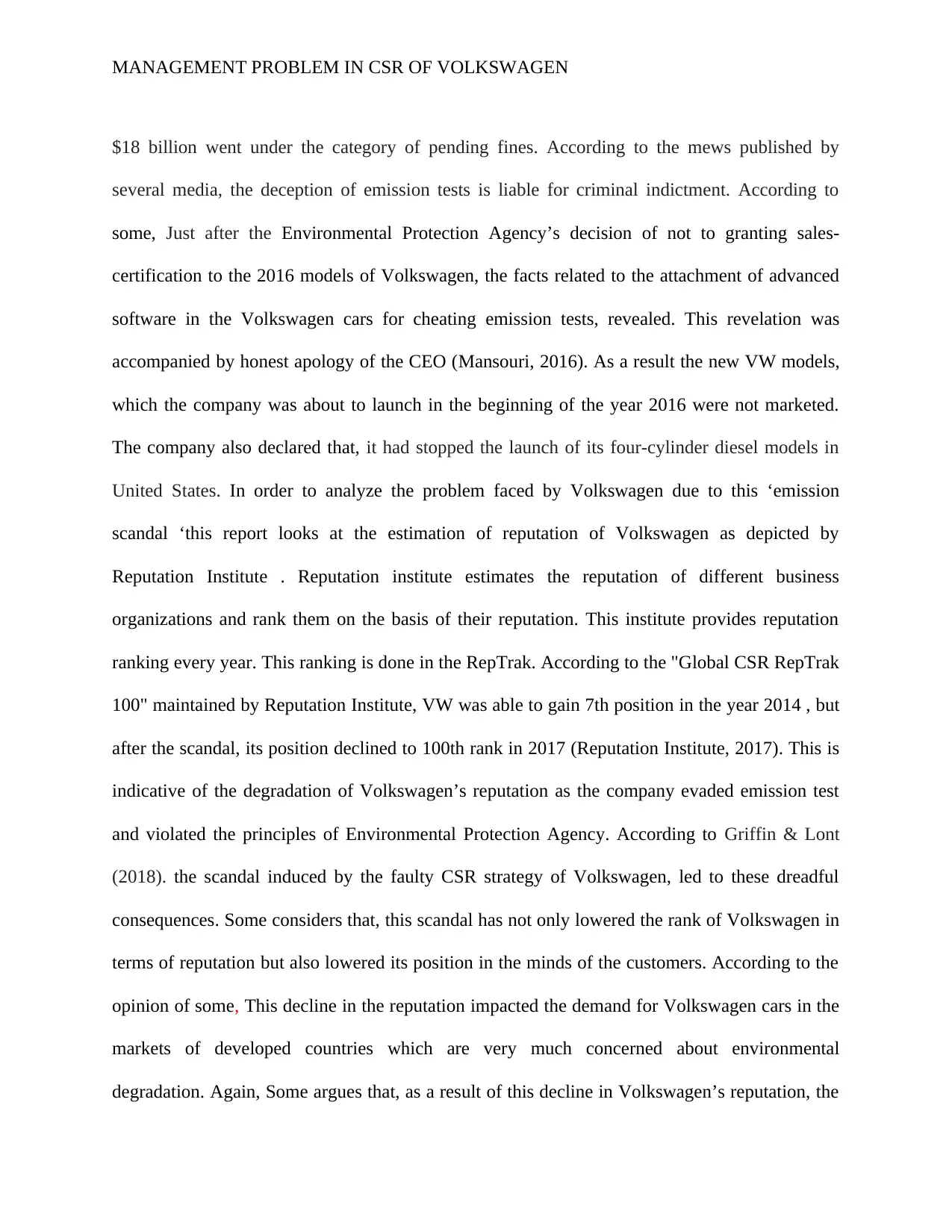
MANAGEMENT PROBLEM IN CSR OF VOLKSWAGEN
$18 billion went under the category of pending fines. According to the mews published by
several media, the deception of emission tests is liable for criminal indictment. According to
some, Just after the Environmental Protection Agency’s decision of not to granting sales-
certification to the 2016 models of Volkswagen, the facts related to the attachment of advanced
software in the Volkswagen cars for cheating emission tests, revealed. This revelation was
accompanied by honest apology of the CEO (Mansouri, 2016). As a result the new VW models,
which the company was about to launch in the beginning of the year 2016 were not marketed.
The company also declared that, it had stopped the launch of its four-cylinder diesel models in
United States. In order to analyze the problem faced by Volkswagen due to this ‘emission
scandal ‘this report looks at the estimation of reputation of Volkswagen as depicted by
Reputation Institute . Reputation institute estimates the reputation of different business
organizations and rank them on the basis of their reputation. This institute provides reputation
ranking every year. This ranking is done in the RepTrak. According to the "Global CSR RepTrak
100" maintained by Reputation Institute, VW was able to gain 7th position in the year 2014 , but
after the scandal, its position declined to 100th rank in 2017 (Reputation Institute, 2017). This is
indicative of the degradation of Volkswagen’s reputation as the company evaded emission test
and violated the principles of Environmental Protection Agency. According to Griffin & Lont
(2018). the scandal induced by the faulty CSR strategy of Volkswagen, led to these dreadful
consequences. Some considers that, this scandal has not only lowered the rank of Volkswagen in
terms of reputation but also lowered its position in the minds of the customers. According to the
opinion of some, This decline in the reputation impacted the demand for Volkswagen cars in the
markets of developed countries which are very much concerned about environmental
degradation. Again, Some argues that, as a result of this decline in Volkswagen’s reputation, the
$18 billion went under the category of pending fines. According to the mews published by
several media, the deception of emission tests is liable for criminal indictment. According to
some, Just after the Environmental Protection Agency’s decision of not to granting sales-
certification to the 2016 models of Volkswagen, the facts related to the attachment of advanced
software in the Volkswagen cars for cheating emission tests, revealed. This revelation was
accompanied by honest apology of the CEO (Mansouri, 2016). As a result the new VW models,
which the company was about to launch in the beginning of the year 2016 were not marketed.
The company also declared that, it had stopped the launch of its four-cylinder diesel models in
United States. In order to analyze the problem faced by Volkswagen due to this ‘emission
scandal ‘this report looks at the estimation of reputation of Volkswagen as depicted by
Reputation Institute . Reputation institute estimates the reputation of different business
organizations and rank them on the basis of their reputation. This institute provides reputation
ranking every year. This ranking is done in the RepTrak. According to the "Global CSR RepTrak
100" maintained by Reputation Institute, VW was able to gain 7th position in the year 2014 , but
after the scandal, its position declined to 100th rank in 2017 (Reputation Institute, 2017). This is
indicative of the degradation of Volkswagen’s reputation as the company evaded emission test
and violated the principles of Environmental Protection Agency. According to Griffin & Lont
(2018). the scandal induced by the faulty CSR strategy of Volkswagen, led to these dreadful
consequences. Some considers that, this scandal has not only lowered the rank of Volkswagen in
terms of reputation but also lowered its position in the minds of the customers. According to the
opinion of some, This decline in the reputation impacted the demand for Volkswagen cars in the
markets of developed countries which are very much concerned about environmental
degradation. Again, Some argues that, as a result of this decline in Volkswagen’s reputation, the
⊘ This is a preview!⊘
Do you want full access?
Subscribe today to unlock all pages.

Trusted by 1+ million students worldwide
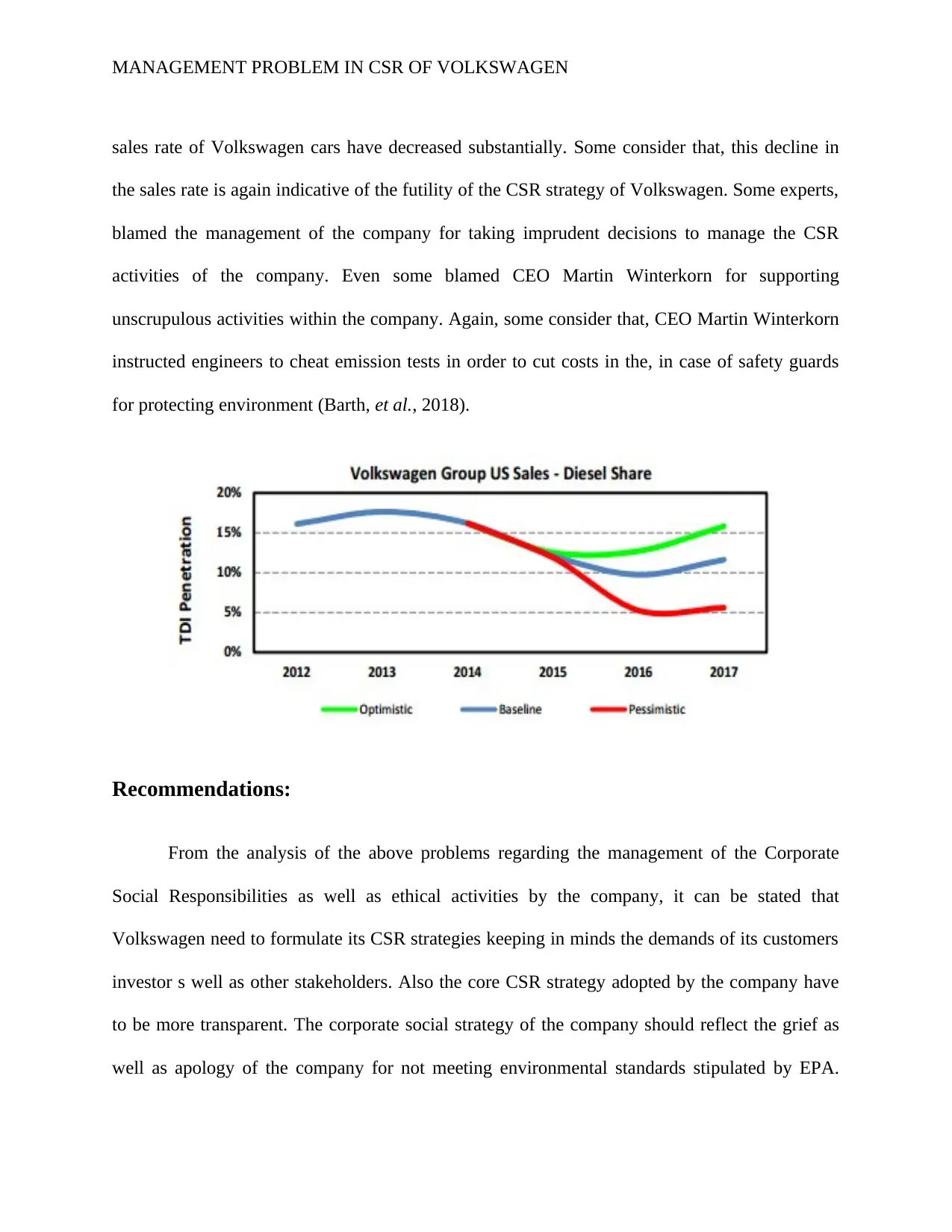
MANAGEMENT PROBLEM IN CSR OF VOLKSWAGEN
sales rate of Volkswagen cars have decreased substantially. Some consider that, this decline in
the sales rate is again indicative of the futility of the CSR strategy of Volkswagen. Some experts,
blamed the management of the company for taking imprudent decisions to manage the CSR
activities of the company. Even some blamed CEO Martin Winterkorn for supporting
unscrupulous activities within the company. Again, some consider that, CEO Martin Winterkorn
instructed engineers to cheat emission tests in order to cut costs in the, in case of safety guards
for protecting environment (Barth, et al., 2018).
Recommendations:
From the analysis of the above problems regarding the management of the Corporate
Social Responsibilities as well as ethical activities by the company, it can be stated that
Volkswagen need to formulate its CSR strategies keeping in minds the demands of its customers
investor s well as other stakeholders. Also the core CSR strategy adopted by the company have
to be more transparent. The corporate social strategy of the company should reflect the grief as
well as apology of the company for not meeting environmental standards stipulated by EPA.
sales rate of Volkswagen cars have decreased substantially. Some consider that, this decline in
the sales rate is again indicative of the futility of the CSR strategy of Volkswagen. Some experts,
blamed the management of the company for taking imprudent decisions to manage the CSR
activities of the company. Even some blamed CEO Martin Winterkorn for supporting
unscrupulous activities within the company. Again, some consider that, CEO Martin Winterkorn
instructed engineers to cheat emission tests in order to cut costs in the, in case of safety guards
for protecting environment (Barth, et al., 2018).
Recommendations:
From the analysis of the above problems regarding the management of the Corporate
Social Responsibilities as well as ethical activities by the company, it can be stated that
Volkswagen need to formulate its CSR strategies keeping in minds the demands of its customers
investor s well as other stakeholders. Also the core CSR strategy adopted by the company have
to be more transparent. The corporate social strategy of the company should reflect the grief as
well as apology of the company for not meeting environmental standards stipulated by EPA.
Paraphrase This Document
Need a fresh take? Get an instant paraphrase of this document with our AI Paraphraser
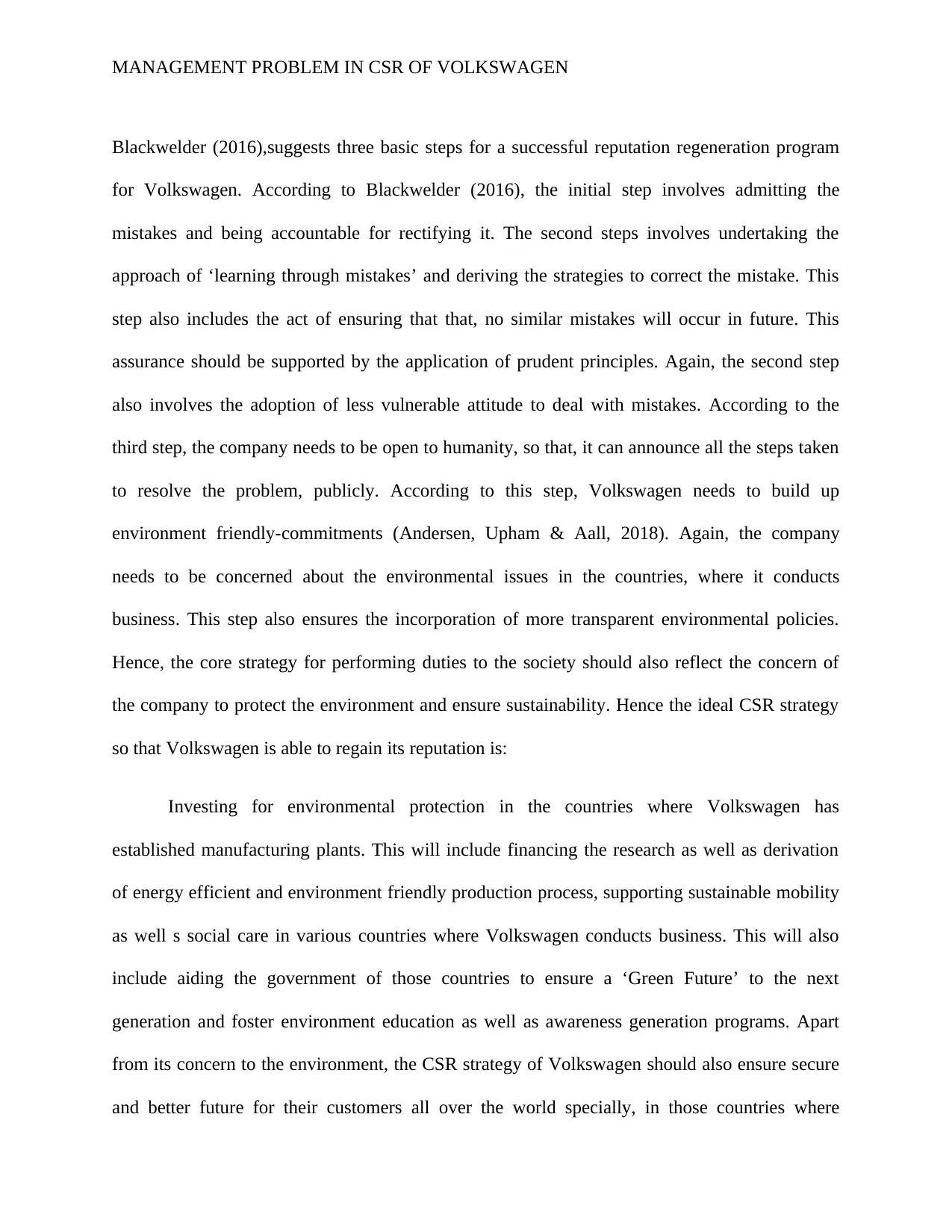
MANAGEMENT PROBLEM IN CSR OF VOLKSWAGEN
Blackwelder (2016),suggests three basic steps for a successful reputation regeneration program
for Volkswagen. According to Blackwelder (2016), the initial step involves admitting the
mistakes and being accountable for rectifying it. The second steps involves undertaking the
approach of ‘learning through mistakes’ and deriving the strategies to correct the mistake. This
step also includes the act of ensuring that that, no similar mistakes will occur in future. This
assurance should be supported by the application of prudent principles. Again, the second step
also involves the adoption of less vulnerable attitude to deal with mistakes. According to the
third step, the company needs to be open to humanity, so that, it can announce all the steps taken
to resolve the problem, publicly. According to this step, Volkswagen needs to build up
environment friendly-commitments (Andersen, Upham & Aall, 2018). Again, the company
needs to be concerned about the environmental issues in the countries, where it conducts
business. This step also ensures the incorporation of more transparent environmental policies.
Hence, the core strategy for performing duties to the society should also reflect the concern of
the company to protect the environment and ensure sustainability. Hence the ideal CSR strategy
so that Volkswagen is able to regain its reputation is:
Investing for environmental protection in the countries where Volkswagen has
established manufacturing plants. This will include financing the research as well as derivation
of energy efficient and environment friendly production process, supporting sustainable mobility
as well s social care in various countries where Volkswagen conducts business. This will also
include aiding the government of those countries to ensure a ‘Green Future’ to the next
generation and foster environment education as well as awareness generation programs. Apart
from its concern to the environment, the CSR strategy of Volkswagen should also ensure secure
and better future for their customers all over the world specially, in those countries where
Blackwelder (2016),suggests three basic steps for a successful reputation regeneration program
for Volkswagen. According to Blackwelder (2016), the initial step involves admitting the
mistakes and being accountable for rectifying it. The second steps involves undertaking the
approach of ‘learning through mistakes’ and deriving the strategies to correct the mistake. This
step also includes the act of ensuring that that, no similar mistakes will occur in future. This
assurance should be supported by the application of prudent principles. Again, the second step
also involves the adoption of less vulnerable attitude to deal with mistakes. According to the
third step, the company needs to be open to humanity, so that, it can announce all the steps taken
to resolve the problem, publicly. According to this step, Volkswagen needs to build up
environment friendly-commitments (Andersen, Upham & Aall, 2018). Again, the company
needs to be concerned about the environmental issues in the countries, where it conducts
business. This step also ensures the incorporation of more transparent environmental policies.
Hence, the core strategy for performing duties to the society should also reflect the concern of
the company to protect the environment and ensure sustainability. Hence the ideal CSR strategy
so that Volkswagen is able to regain its reputation is:
Investing for environmental protection in the countries where Volkswagen has
established manufacturing plants. This will include financing the research as well as derivation
of energy efficient and environment friendly production process, supporting sustainable mobility
as well s social care in various countries where Volkswagen conducts business. This will also
include aiding the government of those countries to ensure a ‘Green Future’ to the next
generation and foster environment education as well as awareness generation programs. Apart
from its concern to the environment, the CSR strategy of Volkswagen should also ensure secure
and better future for their customers all over the world specially, in those countries where
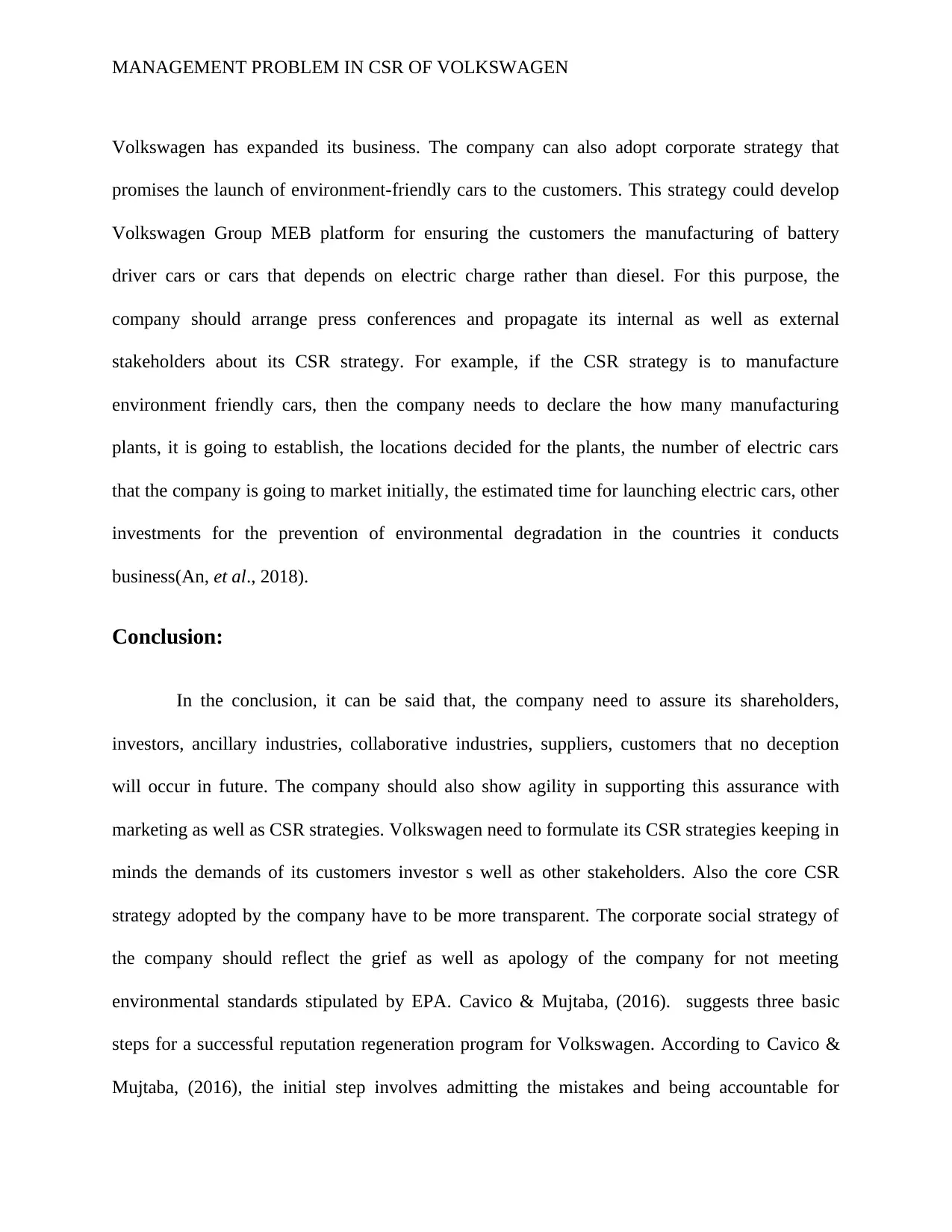
MANAGEMENT PROBLEM IN CSR OF VOLKSWAGEN
Volkswagen has expanded its business. The company can also adopt corporate strategy that
promises the launch of environment-friendly cars to the customers. This strategy could develop
Volkswagen Group MEB platform for ensuring the customers the manufacturing of battery
driver cars or cars that depends on electric charge rather than diesel. For this purpose, the
company should arrange press conferences and propagate its internal as well as external
stakeholders about its CSR strategy. For example, if the CSR strategy is to manufacture
environment friendly cars, then the company needs to declare the how many manufacturing
plants, it is going to establish, the locations decided for the plants, the number of electric cars
that the company is going to market initially, the estimated time for launching electric cars, other
investments for the prevention of environmental degradation in the countries it conducts
business(An, et al., 2018).
Conclusion:
In the conclusion, it can be said that, the company need to assure its shareholders,
investors, ancillary industries, collaborative industries, suppliers, customers that no deception
will occur in future. The company should also show agility in supporting this assurance with
marketing as well as CSR strategies. Volkswagen need to formulate its CSR strategies keeping in
minds the demands of its customers investor s well as other stakeholders. Also the core CSR
strategy adopted by the company have to be more transparent. The corporate social strategy of
the company should reflect the grief as well as apology of the company for not meeting
environmental standards stipulated by EPA. Cavico & Mujtaba, (2016). suggests three basic
steps for a successful reputation regeneration program for Volkswagen. According to Cavico &
Mujtaba, (2016), the initial step involves admitting the mistakes and being accountable for
Volkswagen has expanded its business. The company can also adopt corporate strategy that
promises the launch of environment-friendly cars to the customers. This strategy could develop
Volkswagen Group MEB platform for ensuring the customers the manufacturing of battery
driver cars or cars that depends on electric charge rather than diesel. For this purpose, the
company should arrange press conferences and propagate its internal as well as external
stakeholders about its CSR strategy. For example, if the CSR strategy is to manufacture
environment friendly cars, then the company needs to declare the how many manufacturing
plants, it is going to establish, the locations decided for the plants, the number of electric cars
that the company is going to market initially, the estimated time for launching electric cars, other
investments for the prevention of environmental degradation in the countries it conducts
business(An, et al., 2018).
Conclusion:
In the conclusion, it can be said that, the company need to assure its shareholders,
investors, ancillary industries, collaborative industries, suppliers, customers that no deception
will occur in future. The company should also show agility in supporting this assurance with
marketing as well as CSR strategies. Volkswagen need to formulate its CSR strategies keeping in
minds the demands of its customers investor s well as other stakeholders. Also the core CSR
strategy adopted by the company have to be more transparent. The corporate social strategy of
the company should reflect the grief as well as apology of the company for not meeting
environmental standards stipulated by EPA. Cavico & Mujtaba, (2016). suggests three basic
steps for a successful reputation regeneration program for Volkswagen. According to Cavico &
Mujtaba, (2016), the initial step involves admitting the mistakes and being accountable for
⊘ This is a preview!⊘
Do you want full access?
Subscribe today to unlock all pages.

Trusted by 1+ million students worldwide
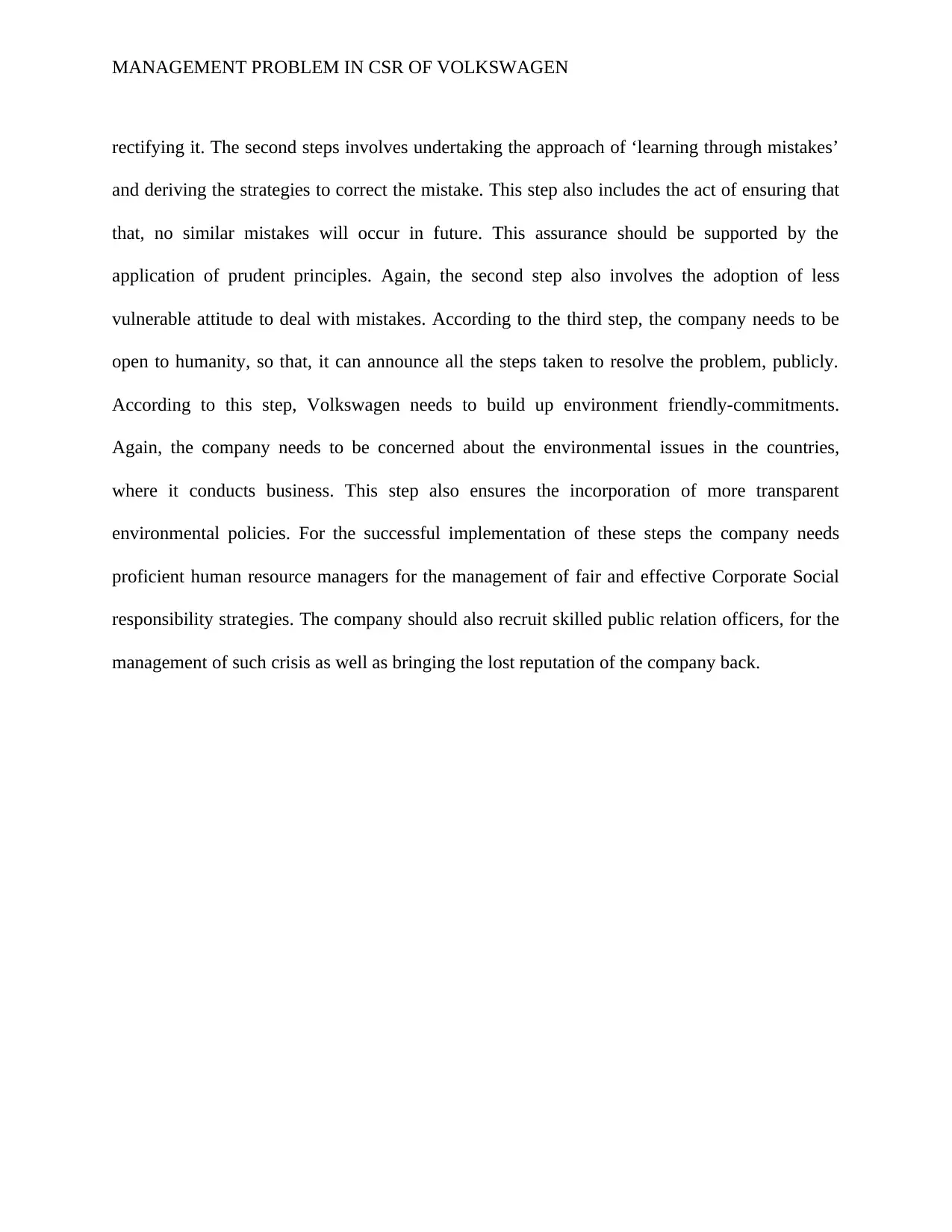
MANAGEMENT PROBLEM IN CSR OF VOLKSWAGEN
rectifying it. The second steps involves undertaking the approach of ‘learning through mistakes’
and deriving the strategies to correct the mistake. This step also includes the act of ensuring that
that, no similar mistakes will occur in future. This assurance should be supported by the
application of prudent principles. Again, the second step also involves the adoption of less
vulnerable attitude to deal with mistakes. According to the third step, the company needs to be
open to humanity, so that, it can announce all the steps taken to resolve the problem, publicly.
According to this step, Volkswagen needs to build up environment friendly-commitments.
Again, the company needs to be concerned about the environmental issues in the countries,
where it conducts business. This step also ensures the incorporation of more transparent
environmental policies. For the successful implementation of these steps the company needs
proficient human resource managers for the management of fair and effective Corporate Social
responsibility strategies. The company should also recruit skilled public relation officers, for the
management of such crisis as well as bringing the lost reputation of the company back.
rectifying it. The second steps involves undertaking the approach of ‘learning through mistakes’
and deriving the strategies to correct the mistake. This step also includes the act of ensuring that
that, no similar mistakes will occur in future. This assurance should be supported by the
application of prudent principles. Again, the second step also involves the adoption of less
vulnerable attitude to deal with mistakes. According to the third step, the company needs to be
open to humanity, so that, it can announce all the steps taken to resolve the problem, publicly.
According to this step, Volkswagen needs to build up environment friendly-commitments.
Again, the company needs to be concerned about the environmental issues in the countries,
where it conducts business. This step also ensures the incorporation of more transparent
environmental policies. For the successful implementation of these steps the company needs
proficient human resource managers for the management of fair and effective Corporate Social
responsibility strategies. The company should also recruit skilled public relation officers, for the
management of such crisis as well as bringing the lost reputation of the company back.
Paraphrase This Document
Need a fresh take? Get an instant paraphrase of this document with our AI Paraphraser
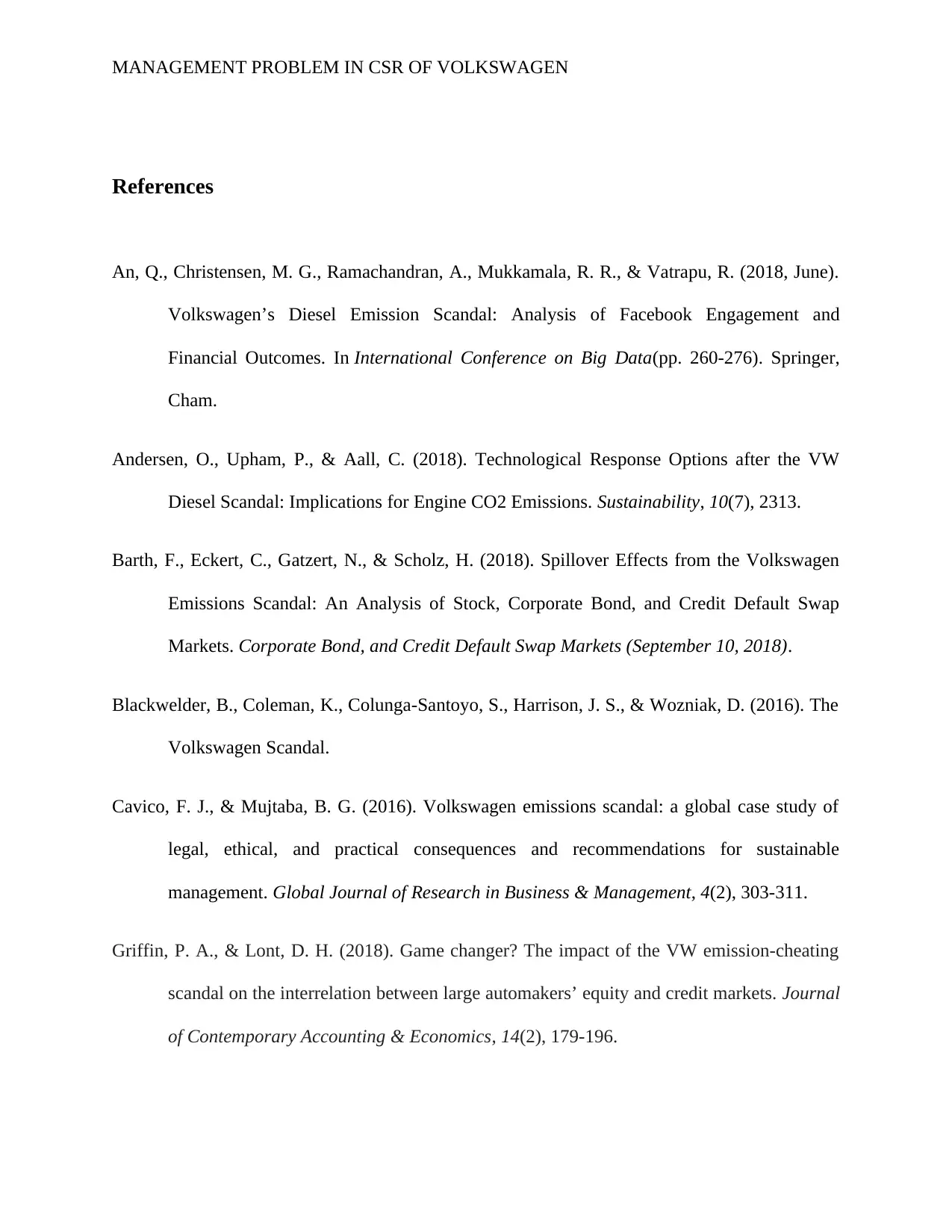
MANAGEMENT PROBLEM IN CSR OF VOLKSWAGEN
References
An, Q., Christensen, M. G., Ramachandran, A., Mukkamala, R. R., & Vatrapu, R. (2018, June).
Volkswagen’s Diesel Emission Scandal: Analysis of Facebook Engagement and
Financial Outcomes. In International Conference on Big Data(pp. 260-276). Springer,
Cham.
Andersen, O., Upham, P., & Aall, C. (2018). Technological Response Options after the VW
Diesel Scandal: Implications for Engine CO2 Emissions. Sustainability, 10(7), 2313.
Barth, F., Eckert, C., Gatzert, N., & Scholz, H. (2018). Spillover Effects from the Volkswagen
Emissions Scandal: An Analysis of Stock, Corporate Bond, and Credit Default Swap
Markets. Corporate Bond, and Credit Default Swap Markets (September 10, 2018).
Blackwelder, B., Coleman, K., Colunga-Santoyo, S., Harrison, J. S., & Wozniak, D. (2016). The
Volkswagen Scandal.
Cavico, F. J., & Mujtaba, B. G. (2016). Volkswagen emissions scandal: a global case study of
legal, ethical, and practical consequences and recommendations for sustainable
management. Global Journal of Research in Business & Management, 4(2), 303-311.
Griffin, P. A., & Lont, D. H. (2018). Game changer? The impact of the VW emission-cheating
scandal on the interrelation between large automakers’ equity and credit markets. Journal
of Contemporary Accounting & Economics, 14(2), 179-196.
References
An, Q., Christensen, M. G., Ramachandran, A., Mukkamala, R. R., & Vatrapu, R. (2018, June).
Volkswagen’s Diesel Emission Scandal: Analysis of Facebook Engagement and
Financial Outcomes. In International Conference on Big Data(pp. 260-276). Springer,
Cham.
Andersen, O., Upham, P., & Aall, C. (2018). Technological Response Options after the VW
Diesel Scandal: Implications for Engine CO2 Emissions. Sustainability, 10(7), 2313.
Barth, F., Eckert, C., Gatzert, N., & Scholz, H. (2018). Spillover Effects from the Volkswagen
Emissions Scandal: An Analysis of Stock, Corporate Bond, and Credit Default Swap
Markets. Corporate Bond, and Credit Default Swap Markets (September 10, 2018).
Blackwelder, B., Coleman, K., Colunga-Santoyo, S., Harrison, J. S., & Wozniak, D. (2016). The
Volkswagen Scandal.
Cavico, F. J., & Mujtaba, B. G. (2016). Volkswagen emissions scandal: a global case study of
legal, ethical, and practical consequences and recommendations for sustainable
management. Global Journal of Research in Business & Management, 4(2), 303-311.
Griffin, P. A., & Lont, D. H. (2018). Game changer? The impact of the VW emission-cheating
scandal on the interrelation between large automakers’ equity and credit markets. Journal
of Contemporary Accounting & Economics, 14(2), 179-196.
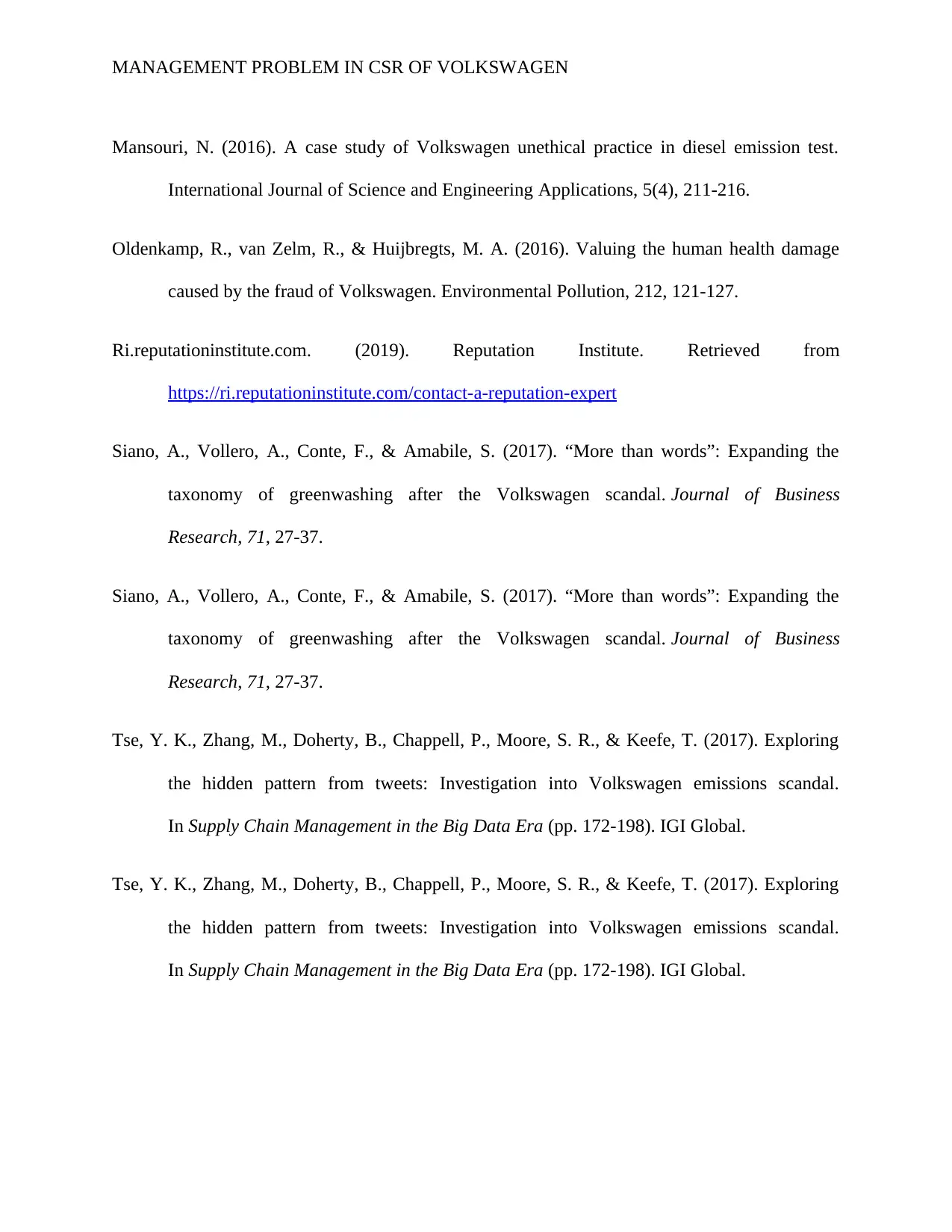
MANAGEMENT PROBLEM IN CSR OF VOLKSWAGEN
Mansouri, N. (2016). A case study of Volkswagen unethical practice in diesel emission test.
International Journal of Science and Engineering Applications, 5(4), 211-216.
Oldenkamp, R., van Zelm, R., & Huijbregts, M. A. (2016). Valuing the human health damage
caused by the fraud of Volkswagen. Environmental Pollution, 212, 121-127.
Ri.reputationinstitute.com. (2019). Reputation Institute. Retrieved from
https://ri.reputationinstitute.com/contact-a-reputation-expert
Siano, A., Vollero, A., Conte, F., & Amabile, S. (2017). “More than words”: Expanding the
taxonomy of greenwashing after the Volkswagen scandal. Journal of Business
Research, 71, 27-37.
Siano, A., Vollero, A., Conte, F., & Amabile, S. (2017). “More than words”: Expanding the
taxonomy of greenwashing after the Volkswagen scandal. Journal of Business
Research, 71, 27-37.
Tse, Y. K., Zhang, M., Doherty, B., Chappell, P., Moore, S. R., & Keefe, T. (2017). Exploring
the hidden pattern from tweets: Investigation into Volkswagen emissions scandal.
In Supply Chain Management in the Big Data Era (pp. 172-198). IGI Global.
Tse, Y. K., Zhang, M., Doherty, B., Chappell, P., Moore, S. R., & Keefe, T. (2017). Exploring
the hidden pattern from tweets: Investigation into Volkswagen emissions scandal.
In Supply Chain Management in the Big Data Era (pp. 172-198). IGI Global.
Mansouri, N. (2016). A case study of Volkswagen unethical practice in diesel emission test.
International Journal of Science and Engineering Applications, 5(4), 211-216.
Oldenkamp, R., van Zelm, R., & Huijbregts, M. A. (2016). Valuing the human health damage
caused by the fraud of Volkswagen. Environmental Pollution, 212, 121-127.
Ri.reputationinstitute.com. (2019). Reputation Institute. Retrieved from
https://ri.reputationinstitute.com/contact-a-reputation-expert
Siano, A., Vollero, A., Conte, F., & Amabile, S. (2017). “More than words”: Expanding the
taxonomy of greenwashing after the Volkswagen scandal. Journal of Business
Research, 71, 27-37.
Siano, A., Vollero, A., Conte, F., & Amabile, S. (2017). “More than words”: Expanding the
taxonomy of greenwashing after the Volkswagen scandal. Journal of Business
Research, 71, 27-37.
Tse, Y. K., Zhang, M., Doherty, B., Chappell, P., Moore, S. R., & Keefe, T. (2017). Exploring
the hidden pattern from tweets: Investigation into Volkswagen emissions scandal.
In Supply Chain Management in the Big Data Era (pp. 172-198). IGI Global.
Tse, Y. K., Zhang, M., Doherty, B., Chappell, P., Moore, S. R., & Keefe, T. (2017). Exploring
the hidden pattern from tweets: Investigation into Volkswagen emissions scandal.
In Supply Chain Management in the Big Data Era (pp. 172-198). IGI Global.
⊘ This is a preview!⊘
Do you want full access?
Subscribe today to unlock all pages.

Trusted by 1+ million students worldwide
1 out of 13
Related Documents
Your All-in-One AI-Powered Toolkit for Academic Success.
+13062052269
info@desklib.com
Available 24*7 on WhatsApp / Email
![[object Object]](/_next/static/media/star-bottom.7253800d.svg)
Unlock your academic potential
Copyright © 2020–2026 A2Z Services. All Rights Reserved. Developed and managed by ZUCOL.




